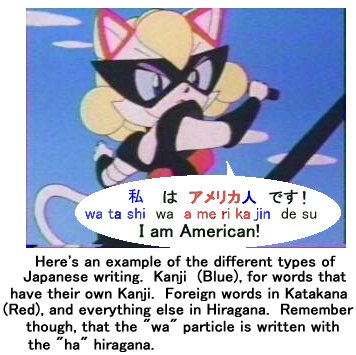 Now that you know some particles to put words together with, let's use the rest of this lesson to learn some words.
Now that you know some particles to put words together with, let's use the rest of this lesson to learn some words. If you use "watashi" (me/I) or "anata" (you) and add "no", they become "My/mine"="Watashi no" and "Your"="anata no". Like in "Watashi no uchi" (wah-tah-shee no ou-chee) "My home" and "Anata no gakko" (Ah-nah-tah no gahk-ko) "Your school". "No" can also show where/what a word is from. Like "Japanese pizza" would be "Nihon no piza" (Nee-hon no pee-zah). "Leader of the Cats" becomes "Neko no shidosha" (Neh-koh no shee-doh-shah). You could translate it as "Cat's Leader". (Notice that "Neko" can mean "Cat" or "Cats") "No" isn't limited to showing ownership, it shows that a word pertains to the word following it, like "White helmet" is "Shiroi no kabuto" (Shee-rohi no kah-boo-toh), which you can translate as "Helmet of white". "In front of" is "Mae no" (Mah-eh no), so, "It's in front of me" is "Watashi no mae no des'"="My front of it is". "No" can be used to link 2 nouns together. Like "School" (Gakko) and "Teacher" (Sensei) can be linked together to make "Gakko no sensei" =School teacher". So, as you can see, "no" is a very important and useful particle to know! So let's practice:
If you use "watashi" (me/I) or "anata" (you) and add "no", they become "My/mine"="Watashi no" and "Your"="anata no". Like in "Watashi no uchi" (wah-tah-shee no ou-chee) "My home" and "Anata no gakko" (Ah-nah-tah no gahk-ko) "Your school". "No" can also show where/what a word is from. Like "Japanese pizza" would be "Nihon no piza" (Nee-hon no pee-zah). "Leader of the Cats" becomes "Neko no shidosha" (Neh-koh no shee-doh-shah). You could translate it as "Cat's Leader". (Notice that "Neko" can mean "Cat" or "Cats") "No" isn't limited to showing ownership, it shows that a word pertains to the word following it, like "White helmet" is "Shiroi no kabuto" (Shee-rohi no kah-boo-toh), which you can translate as "Helmet of white". "In front of" is "Mae no" (Mah-eh no), so, "It's in front of me" is "Watashi no mae no des'"="My front of it is". "No" can be used to link 2 nouns together. Like "School" (Gakko) and "Teacher" (Sensei) can be linked together to make "Gakko no sensei" =School teacher". So, as you can see, "no" is a very important and useful particle to know! So let's practice:
Dare no uchi des' ka? = Who's home is that?
Omistu no uchi des'. = It's Omitsu's home.
Dare no shiroi no kabuto des' ka? = Who's white helmet is that?
Yattaro no kabuto des'. = That is Yattaro's helmet.
Yattaro-san wa neko no shidosha! = Mr. Yattaro, leader of the Cats!
Anata wa nihon no piza ga suki des' ka? = You like Japanese pizza?
Watashi wa Omitsu no o-cha suki des'! = I like Lucille's tea!
 Now that you know some particles to put words together with, let's use the rest of this lesson to learn some words.
Now that you know some particles to put words together with, let's use the rest of this lesson to learn some words.
Nihon (Nee-hon) = Japan
Amerika (Ah-meh-ree-ka) = America
Eikoku (Eh-ee-koh-ku) = England
Nihon-go (Nee-hon-go) = Japanese language
Ei-go (Eh-ee-go) = English language
Nihon-jin (Nee-hon-jeen) = Japanese person
Amerika-jin (Ah-meh-ree-kah-jeen) = American person
Eikoku-jin (Eh-ee-koh-ku-jeen) = English person
Dekimas' (Deh-kee-mahs) = Can/is possible/able to
To help you remember new words you learn try making some sentences with them.
"Watashi wa Amerika-jin des'" = "I am American."
"Anata wa Nihon-jin des' ka?" = "You are Japanese?"
"Anata wa Nihon-go dekimas' ka?" = "Can you speak Japanese?" It's actually said as "You Japanese language able to?". In Japanese, the subject comes before the verb.
That's all for this lesson. Keep practicing!